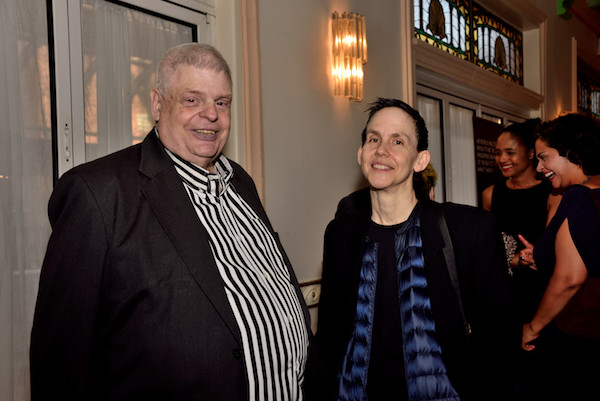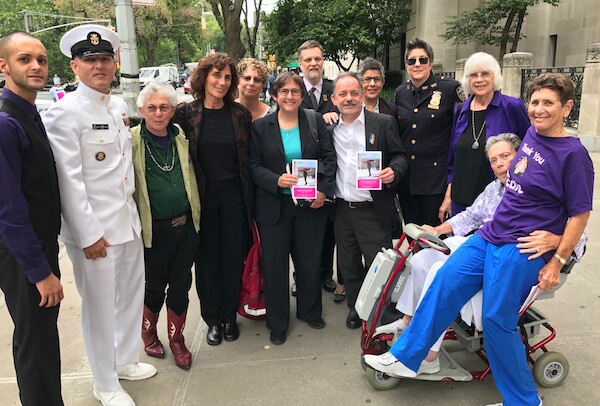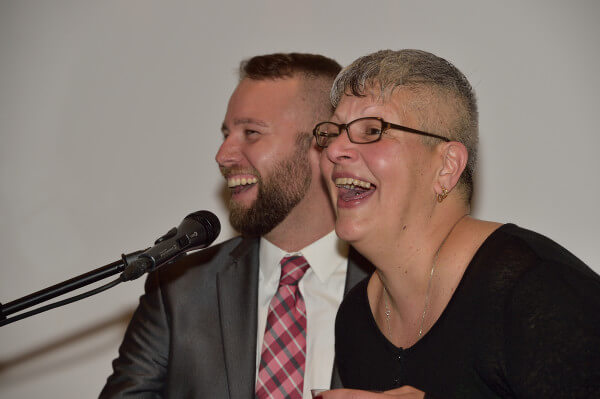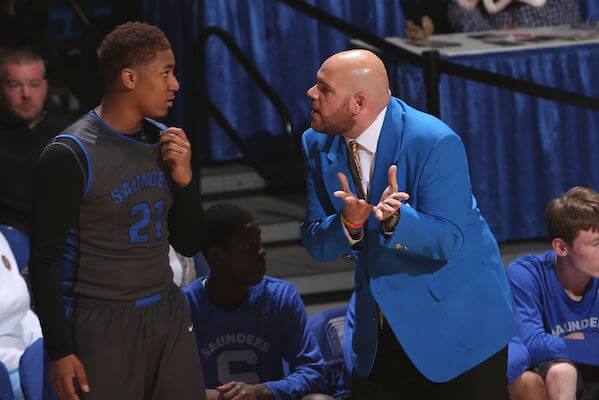Gus Archilla and Elmer Lokkins joined the Marriage Equality New York contingent in a recent LGBT Pride March in Manhattan. | COURTESY: MICHAEL SABATINO
Gus Archilla, who was partnered with his husband Elmer Lokkins for 58 years before the couple was able to legally marry in Canada in 2003, died on November 26, ten days before his 97th birthday.
Lokkins, who is 93, survives Archilla, after a relationship that lasted for 67 years. Meeting just months after the end of World War II, the couple lived in the Archilla family’s apartment in Upper Manhattan’s Washington Heights for their first decade together and, in 1957, bought an apartment in Morningside Gardens, near Columbia University, where they lived for more than half a century.
For the past several years, the couple resided on Marco Island on Florida’s west coast, in an apartment upstairs from Archilla’s niece, Christina Dean. Archilla, who for the past five years suffered from complications of an abdominal aortic aneurysm, was at home there at the time of his death, with Lokkins and other family members on hand.
Dean and her brother, Richard Chimelis, were children of Archilla’s late sister, Idalia, and Chimelis, who lives in Fort Lauderdale, described Archilla and Lokkins as “the traveling glue” of a family that extended across the US and beyond.
“They really were the communication link between a family spread out from upstate New York to California, Florida, Texas, and, for a time, Italy,” Chimelis said several days after his uncle’s death.
In 2007, at the annual Wedding March across the Brooklyn Bridge staged by Marriage Equality New York (MENY), the couple told Gay City News they met by happenstance in Columbus Circle in September 1945, shortly after Lokkins was discharged from the service, after seeing duty in the Philippines, New Guinea, and Australia.
Lokkins, a Washington State native who spent part of his youth in an Illinois orphanage, was in New York hoping to enroll at Columbia and was in Columbus Circle after a voice lesson at Carnegie Hall. Archilla, a native of Puerto Rico, was there listening to political speeches, and Lokkins recalled being approached by someone he immediately came to think of as his “beautiful Spanish don.”
As Lokkins completed the story of their first meeting, Archilla, speaking with evident emotion, said, “After 62 years, it's wonderful to have a partner who gives you a kiss every time he walks by you.”
In 1945, Archilla worked in the city’s then-thriving shipping industry, but according to a 2003 New York Times profile of the couple, he later went to work as the assistant to Lokkins, who was the registrar of the Graduate Center at the City University of New York (CUNY). Chimelis confirmed the account in that Times story that when Lokkins moved into the Archilla household, the family talked about him only as Gus’ friend.
But there was, apparently, from the start a difference between what was talked about and what was understood.
“His father, I think, knew, he accepted Gus, but I doubt he liked it,” Chimelis said.
Archilla’s father was a Presbyterian minister who was strict with his nine children. They, in turn, Chimelis said, “adored their parents” and maintained their devotion to his religion, especially the daughters.
“Most of Gus’ siblings have not wanted to discuss” the specific nature of his relationship with Lokkins, his nephew said. The Times reported that the couple was estranged from one of Archilla’s brothers for 40 years, until the man developed Alzheimer’s disease.
Others of Archilla’s brothers and sisters were more accepting, but had their limits.
Dean and Chimelis’ mother was the one closest to Archilla, but she was “particularly stubborn” about not addressing her brother’s homosexuality. When her husband casually mentioned it to their children, who had “sort of grown to realize it,” Idalia said “we would never talk about it,” Chimelis recalled.
“My mother was not gracious about the wedding,” he said, something her children gave her “a hard time about.” Archilla, Chimelis added, “was pissed” at his sister over that, and the two grew a bit “less close.”
The challenge of living in what was in some ways a glass closet influenced Gus and Elmer’s behavior around other people. The first time they publicly embraced was at their wedding in Niagara Falls, Ontario.
“My sister and I were so glad that they were finally able to be free with each other,” Chimelis said.
Even with their longstanding discretion, others outside their families understood the two men shared a deep connection — and the response was not always friendly. At the 2005 MENY Wedding March, Lokkins recalled that when a retirement party was held three decades earlier for the CUNY president, one of the deans said to him, “Well, you aren’t going to bring Gus, are you?” In fact, the couple went to the party together, and, Lokkins said, they made a practice of accompanying each other to major events in their lives from that point forward.
Archilla and Lokkins attended a number of Wedding Marches in the years prior to passage of New York’s marriage equality law in 2011, and, according to the Times, helped carry the banner for SAGE, Services and Advocacy for GLBT Elders, at the 1993 March on Washington. At the 2005 Wedding March, acknowledging that he and Archilla never expected to see the day when they could legally marry, Lokkins advised activists hoping to follow suit here in New York to “keep on pushing.”
Two years later, Archilla, then 91, spoke to the Wedding March crowd in Cadman Plaza on the Brooklyn side of the bridge, telling them, “Canada made it possible for us. I hope everywhere else it will soon be possible. Maybe while we are still alive, though there is not much time left.”
If the legal landscape changed only slowly over the couple’s long relationship, their bond with their families deepened much earlier.
“Our Uncles Gus and Elmer have been together and in our lives since we were born, and we love them dearly,” Chimelis wrote in an email message responding to Gay City News’ query.
He later told the newspaper that after Archilla’s father died when Gus was a young man, he became “head of the family,” a role in which he was respected. The two men provided financial support to every one of their nieces and nephews and grandnieces and grandnephews when they attended college, including Chimelis’ two stepdaughters. Archilla’s last remaining sibling, Eliel, and a sister-in-law who survived one of his other brothers, saw him in his final weeks.
Gus Archilla is survived by 20 nieces and nephews on his side of the family and another 11 on Lokkins’ side.
Chimelis said that Lokkins suffers from a Parkinson’s-like ailment that severely limits his mobility and speech abilities, but retains strong cognitive skills and spends his time listening to books on tapes and public radio and watching television. Asked if he will remain in the apartment in Dean’s building, Chimelis responded, “Elmer is as much our family as Gus. Elmer will stay put.”




































